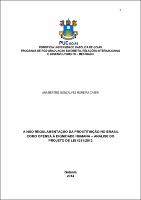| Compartilhamento |


|
Use este identificador para citar ou linkar para este item:
http://tede2.pucgoias.edu.br:8080/handle/tede/2723Registro completo de metadados
| Campo DC | Valor | Idioma |
|---|---|---|
| dc.creator | Caser, Ana Beatriz Gonçalves Moreira | - |
| dc.creator.Lattes | http://lattes.cnpq.br/6953975752976277 | por |
| dc.contributor.advisor1 | Barbosa, Ycarim Melgaço | - |
| dc.contributor.advisor1Lattes | http://lattes.cnpq.br/9791745313665253 | por |
| dc.contributor.referee1 | Silva, Germano Campos | - |
| dc.contributor.referee1Lattes | http://lattes.cnpq.br/3695583765198760 | por |
| dc.contributor.referee2 | Pinheiro, Veralúcia | - |
| dc.contributor.referee2Lattes | http://lattes.cnpq.br/8080898661942973 | por |
| dc.date.accessioned | 2016-08-10T10:47:29Z | - |
| dc.date.available | 2015-09-03 | - |
| dc.date.issued | 2014-03-25 | - |
| dc.identifier.citation | CASER, Ana Beatriz Gonçalves Moreira. A NÃO REGULAMENTAÇÃO DA PROSTITUIÇÃO NO BRASIL COMO OFENSA À DIGNIDADE HUMANA ANÁLISE DO PROJETO DE LEI 4211-2012.. 2014. 135 f. Dissertação (Mestrado em Ciências Humanas) - Pontifícia Universidade Católica de Goiás, GOIÂNIA, 2014. | por |
| dc.identifier.uri | http://localhost:8080/tede/handle/tede/2723 | - |
| dc.description.resumo | O tema central deste trabalho é a regulamentação da atividade dos profissionais do sexo no Brasil como mecanismo de promoção da dignidade humana. Sendo que o ponto de partida para a compreensão deste problema é a dignidade humana conjugada com a liberdade como princípio informativo da democracia que orienta a proteção jurídica e social do Estado para com seus cidadãos. Agrega-se a tal compreensão a necessidade de se aprofundar as noções de justiça e dignidade a partir da realidade opressora que homens exercem sobre as mulheres na prática social, daí porque se aborda a teoria feminina como forma de investigar qual é o papel da mulher na sociedade e como ele reflete nas assimetrias das relações sociais. Termina-se analisando o projeto de lei que visa a regulamentação da atividade dos profissionais do sexo no Brasil. | por |
| dc.description.abstract | The main theme of this dissertation is the regulation of the activity of sex workers in Brazil a means of promoting human dignity. Since the starting point for understanding this problem is human dignity coupled with freedom as informative principale of democracy that guides the legal and social protection of the state towards its people. Added to that understanding the need to deepen the notions of justice and dignity from the oppressive reality that men have over women in social practice, hence why it tackles the female theory as a way to investigate what is the role of women in society and how it reflects the asymmetry of social relations. Finishes is reviewing the bill that aims to regulate the activity of sex workers in Brasil. | eng |
| dc.description.provenance | Made available in DSpace on 2016-08-10T10:47:29Z (GMT). No. of bitstreams: 1 ANA BEATRIZ GONCALVES MOREIRA CASER.pdf: 643390 bytes, checksum: 0cef976f37c9e40dd64f7dce7a85e852 (MD5) Previous issue date: 2014-03-25 | eng |
| dc.format | application/pdf | por |
| dc.thumbnail.url | http://localhost:8080/tede/retrieve/8424/ANA%20BEATRIZ%20GONCALVES%20MOREIRA%20CASER.pdf.jpg | * |
| dc.language | por | por |
| dc.publisher | Pontifícia Universidade Católica de Goiás | por |
| dc.publisher.department | Ciências Humanas | por |
| dc.publisher.country | BR | por |
| dc.publisher.initials | PUC Goiás | por |
| dc.publisher.program | Direito, Relações Internacionais e Desenvolvimento | por |
| dc.rights | Acesso Aberto | por |
| dc.subject | Prostituição | por |
| dc.subject | Regulamentação | por |
| dc.subject | Dignidade | por |
| dc.subject | prostitution | eng |
| dc.subject | regulatory | eng |
| dc.subject | dignity | eng |
| dc.subject.cnpq | CNPQ::CIENCIAS SOCIAIS APLICADAS::DIREITO | por |
| dc.title | A NÃO REGULAMENTAÇÃO DA PROSTITUIÇÃO NO BRASIL COMO OFENSA À DIGNIDADE HUMANA ANÁLISE DO PROJETO DE LEI 4211-2012. | por |
| dc.type | Dissertação | por |
| Aparece nas coleções: | Mestrado em Direito, Relações Internacionais e Desenvolvimento | |
Arquivos associados a este item:
| Arquivo | Descrição | Tamanho | Formato | |
|---|---|---|---|---|
| ANA BEATRIZ GONCALVES MOREIRA CASER.pdf | 628,31 kB | Adobe PDF |  Baixar/Abrir Pré-Visualizar |
Os itens no repositório estão protegidos por copyright, com todos os direitos reservados, salvo quando é indicado o contrário.




